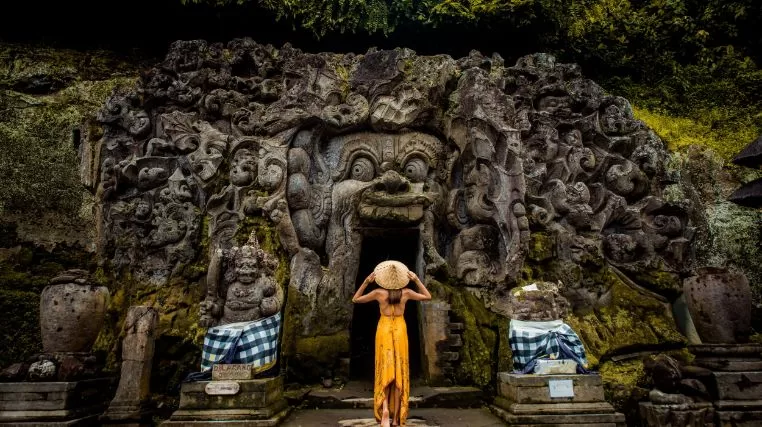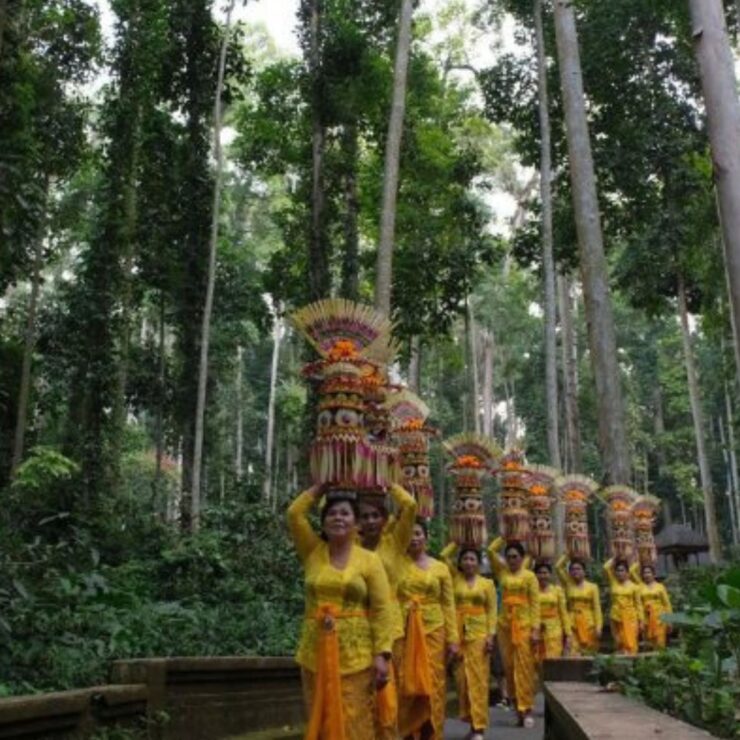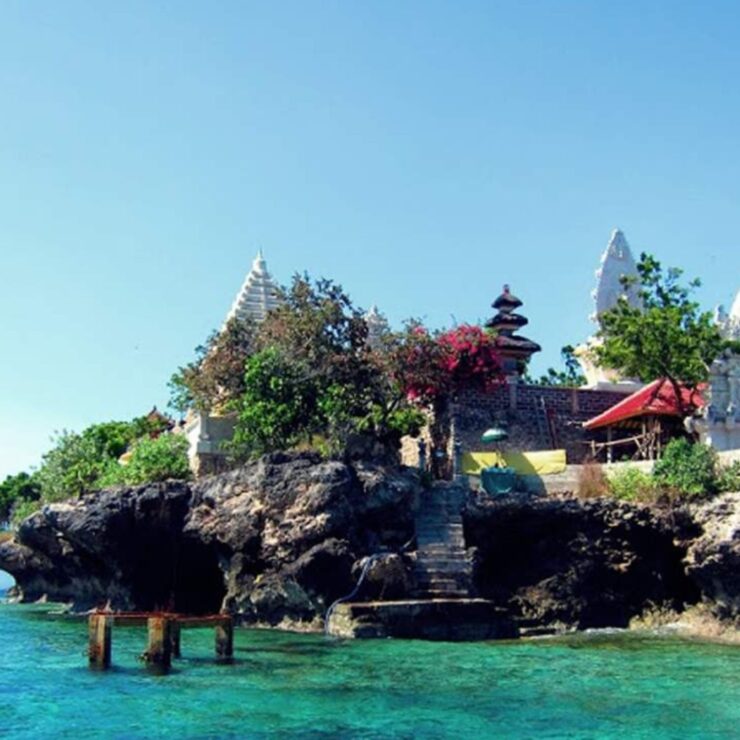Goa Gajah Ubud – Delve into the heart of Bali, a realm where ethereal landscapes harmoniously meld with profound spirituality, and you’ll discover the treasure that is Goa Gajah. This historical gem, emblematic of Bali’s intricate weave of culture, history, and tradition, beckons travelers to embark on a transcendent journey through time. Tucked away amidst verdant greenery, this site does more than satiate the eyes; it offers an introspective dive into the very essence of Balinese heritage. For wanderers eager to capture the authentic pulse of Bali, commencing their journey at Goa Gajah is undeniably a foray into the island’s enduring spirit.
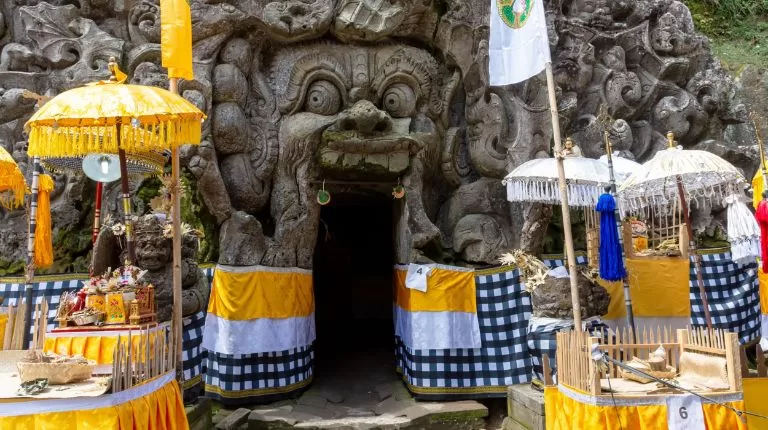
1. History of Goa Gajah
Goa Gajah, colloquially known as the Elephant Cave, is steeped in history, harking back to the times of the Warmadewa Dynasty during the 10th and 11th centuries AD. This prestigious archaeological marvel stands as a beacon, illuminating Bali’s intricate web of historical sequences and cultural metamorphoses. Originally established as a haven for Hindu worshipers, this age-old cavern has, over the centuries, been a silent spectator to numerous archaeological revelations. Trailblazers like L.C. Heyting in 1923 and Dr. W.F. Stutterheim in 1925 championed momentous explorations here. The detailed excavations that spanned from 1954 to 1979 have further pulled back the veils, casting light on Bali’s rich and layered past.
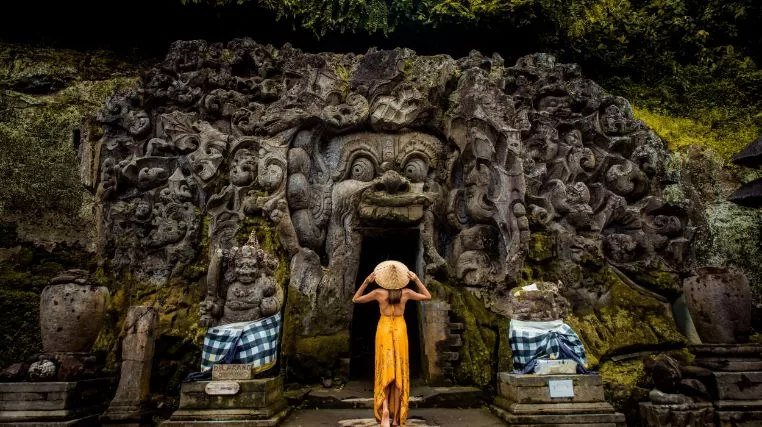
2. The Strategic Location of Goa Gajah
Nestled within the verdant embrace of Bedulu Village, Goa Gajah serves as a haven of tranquility, juxtaposed against Bali’s vibrant epicenters. A mere 26km away from Denpasar’s bustling heart, 40km from the lively beats of Kuta, and just 5km from the artistic corridors of Ubud, the temple’s positioning is both strategic and scenic. As it resides gracefully by the placid Petanu riverbank, Goa Gajah witnesses the union of several indigenous streams. Its majestic perch overlooking a spectacular gorge ensures that every visitor is treated to a mesmerizing fusion of nature’s grandeur coupled with deep cultural enrichment.
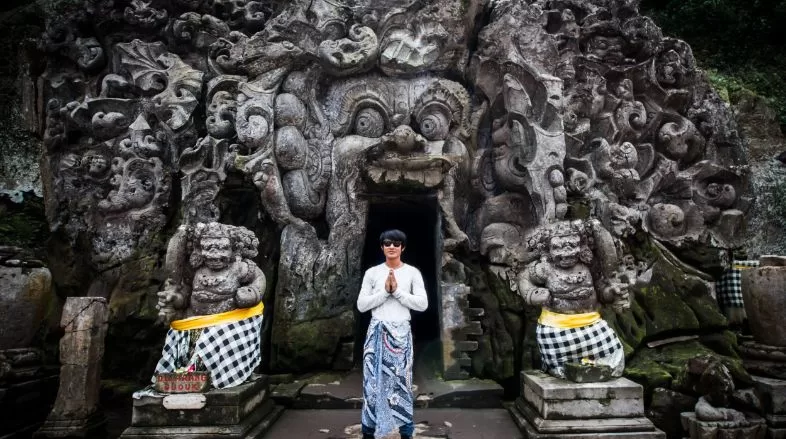
3. Navigating Your Way to Goa Gajah
Beginning your expedition from Denpasar might initially appear daunting due to the absence of direct public transportation. However, every cloud has a silver lining. This particular cloud offers a picturesque 55-minute journey when traversed via Jl. WR Supratman in a personal vehicle. For those nestled in Ubud, either as residents or temporary visitors, a quick 20-minute drive awaits. Opting for roads like Jl. Raya Ubud, Jl. Cok Gede Rai, and Jl. Raya Goa Gajah will guide you straight to Bedulu. As an added perk, these paths unfold with mesmerizing sights, acting as splendid teasers to the magnificence of Goa Gajah that lies ahead.

4. The Entrance Logistics and Timings
Entering Goa Gajah won’t strain your pocket; with an admission fee set between IDR 15,000 to 30,000, most visitors find it reasonable. If you’re driving your own vehicle, don’t forget to allocate some budget for additional parking fees. While the sanctuary officially welcomes guests from 07:00 to 16:00, its spiritual ambiance transcends beyond these temporal confines. Even after the regular visiting hours, the temple’s ambiance is infused with an unmistakable spiritual energy. This vibrancy is further intensified as the temple grounds become a hub for various local religious activities and ceremonies, underscoring its pivotal position in the tapestry of Balinese religious traditions.
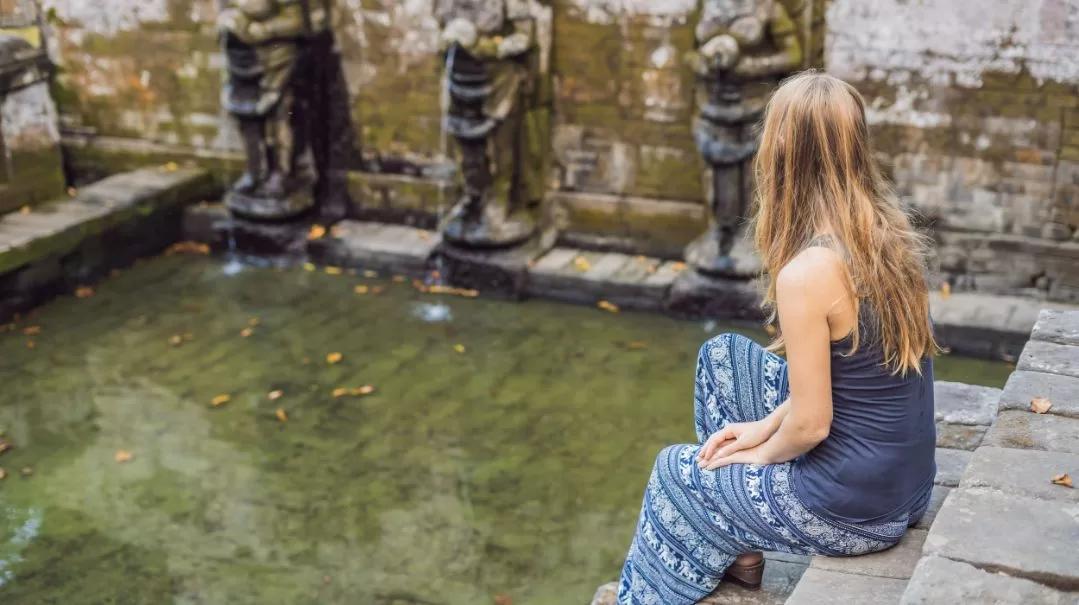
5. Highlighting the Essence of Goa Gajah
- Historic Man-Made Cave: Distinctive in its architectural brilliance, Goa Gajah’s cavernous expanse provides an ambient space conducive for introspective meditation, distinguishing it from Bali’s conventional temple architectures.
- Symbol of Interfaith Harmony: Beyond a mere architectural marvel, it epitomizes the harmonious coexistence of Hinduism and Buddhism, demarcated subtly with an emblematic trench.
- Photography Haven: Photography enthusiasts can revel in locales like the mystical Fountain of the Six Women’s Chests or the serene Tukat Pangkung Complex, offering diverse frames at every corner.
- Stay and Souvenirs: Deepen your immersion into Balinese culture with Ubud’s warm hospitality and find rare souvenirs along Jl. Goa Gajah at Banjar Teges.
- Fountain Statues: These intricate carvings not only embellish the temple grounds but are symbolic representations of Hindu cosmological beliefs, recounting legends of affluence and the sacred rivers of the Indian subcontinent.
- Buddhist Relics: The southern alcove of Goa Gajah holds the very soul of Buddhism in Bali, brimming with contemplative statues and emblems narrating tales of spiritual quests and enlightenment.
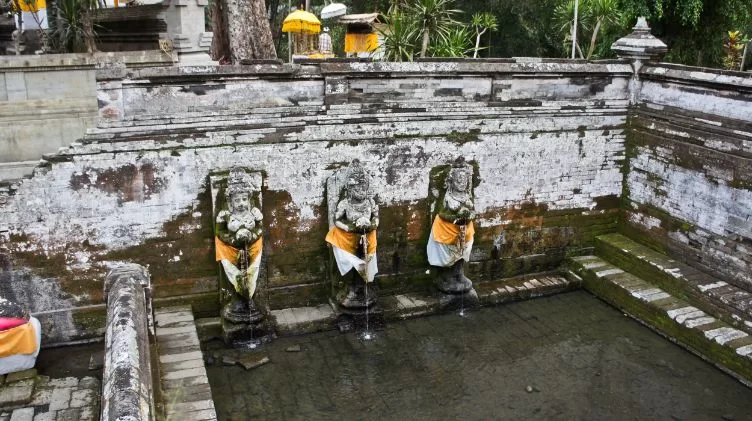
6. Visiting Etiquette
While Goa Gajah welcomes one and all, it’s essential to realize that imbibing its spiritual depth mandates a certain level of respect for the time-honored Balinese customs. Consequently, visitors are gently reminded to adhere to established cultural norms. Furthermore, this includes specific provisions for women, particularly during their menstrual cycle, to steer clear from sacred temple zones. Additionally, dressing modestly is not just a request but an embodiment of reverence towards this holy site. In order to accentuate their attire and honor the traditions, visitors are encouraged to don the traditional ceremonial sash, the ‘selendang.’ Lastly, for the uninitiated or the unprepared, these sashes are readily available at the entrance, ensuring a seamless amalgamation of respect and participation.
Conclusion - Goa Gajah Ubud
Goa Gajah, intricately woven with threads of history, architecture, and spirituality, stands as a poignant testament to Bali’s deep-seated cultural legacy. As the sun casts its golden hues over this iconic landmark, it’s almost instinctive to feel an overwhelming connection to the island’s ancient lineage. Bridging the gap between historical immersion and modern indulgence, consider elevating your Balinese sojourn with a stay at the Uma Dawa Resort and Spa. Nestled amidst nature’s embrace, the resort’s opulent offerings promise to invigorate your senses after a day of cultural exploration. Delving further into this experience, allow yourself to be ensnared by the comforting arms of relaxation and immerse deeply into the Balinese way of life. So, without further ado, book your getaway and savor the exquisite blend of history, opulence, and unmatched hospitality.
Read more article about Ubud Bali Indonesia:
- Best Ubud Culinary: Top 6 Eateries You Must Visit in Ubud
- Monkey Forest Ubud: Dive into Bali’s Sacred Natural Sanctuary
- How Does Ubud Offer a Unique Cultural Experience for Travelers?
Booking Uma Dawa Resort here:

